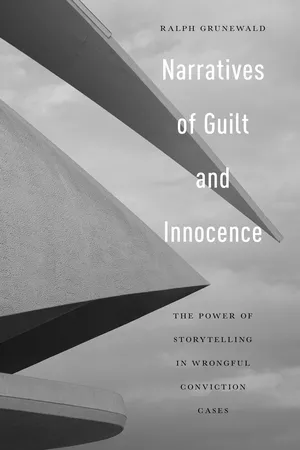
Narratives of Guilt and Innocence
The Power of Storytelling in Wrongful Conviction Cases
- English
- ePUB (mobile friendly)
- Available on iOS & Android
Narratives of Guilt and Innocence
The Power of Storytelling in Wrongful Conviction Cases
About this book
2023 Co-Winner of the Herbert Jacob Book Prize, given by the Law and Society Association
Illustrates how the power of narrative influences how police, prosecutors, juries, and judges construct
legal reality
Wrongful convictions have been studied primarily through the lenses of law, psychology, and the social sciences. Though scholarship has established canonical factors that help explain why the innocent are convicted, a very simple question has not been answered: How is it possible that prosecutors can convince juries and themselves of the guilt of an innocent defendant, often even against strong exculpatory evidence? Narratives of Guilt and Innocence seeks to address this crucial question by highlighting the narrative blueprint of a given criminal justice system and then how the power of narrative influences how police, prosecutors, juries, and judges construct legal reality and the evidence for it. That law and storytelling are connected is a common trope, but we know surprisingly little about the intricate role storytelling plays in criminal cases and wrongful convictions in particular.
This book questions the effectiveness of the adversarial contest between prosecutor and defense as a means to arrive at the truth and argues that narrative is an important a factor in the construction of legal reality. Wrongful convictions exemplify that narrative and truth have an uncomfortable relationship. Ralph Grunewald provides a retelling and reading of well-known miscarriages of justice, including the best-known wrongful conviction in Germany. Applying a comparative perspective shows that the narrative desire as a human trait has a universal power with a persistence that transcends the regulatory and procedural setup of a given system.
Narratives of Guilt and Innocence puts wrongful convictions into an interdisciplinary and comparative context and vividly demonstrates just how much the process of storytelling affects legal reality.
Tools to learn more effectively

Saving Books

Keyword Search

Annotating Text

Listen to it instead
Information
Table of contents
- Cover
- Title Page
- Copyright Page
- Dedication
- Contents
- Preface
- Introduction: Realms of Truth and Justice
- 1. Discourses of Guilt and Innocence: The Innocence Movement as a Narrative Movement
- 2. Speaking of the Truth: Law, Narratology, and the Narrative Imagination
- 3. The Evidentiary Power of Stories: Narrativizing Guilt in an Adversarial System
- 4. Storytelling in an Inquisitorial System: Truer Stories?
- 5. Anatomy of a German Wrongful Conviction: Failing Truth?
- 6. Conclusion: The Ultimate Dystopia or Toward a Narrative of Legal Truth?
- Notes
- Bibliography
- Index
- About the Author
Frequently asked questions
- Essential is ideal for learners and professionals who enjoy exploring a wide range of subjects. Access the Essential Library with 800,000+ trusted titles and best-sellers across business, personal growth, and the humanities. Includes unlimited reading time and Standard Read Aloud voice.
- Complete: Perfect for advanced learners and researchers needing full, unrestricted access. Unlock 1.4M+ books across hundreds of subjects, including academic and specialized titles. The Complete Plan also includes advanced features like Premium Read Aloud and Research Assistant.
Please note we cannot support devices running on iOS 13 and Android 7 or earlier. Learn more about using the app